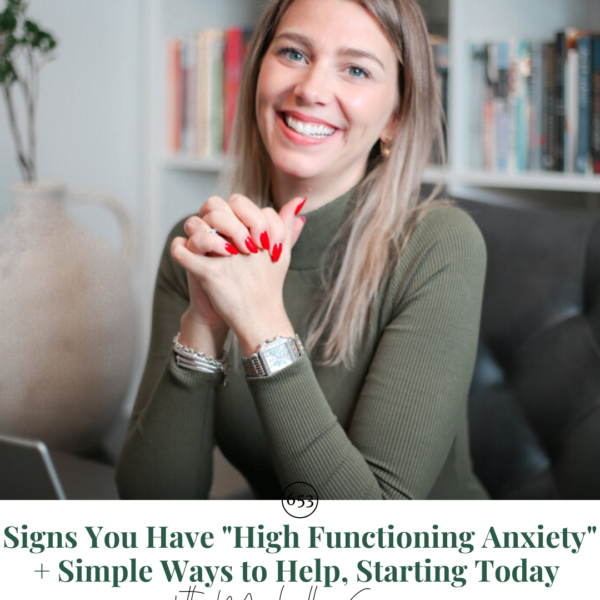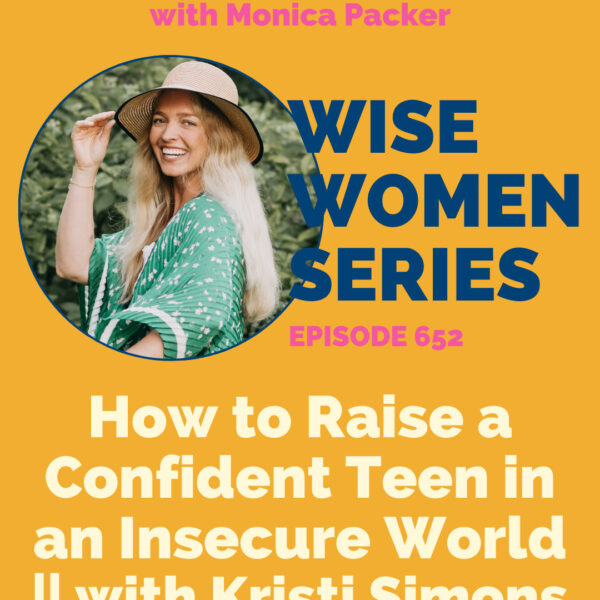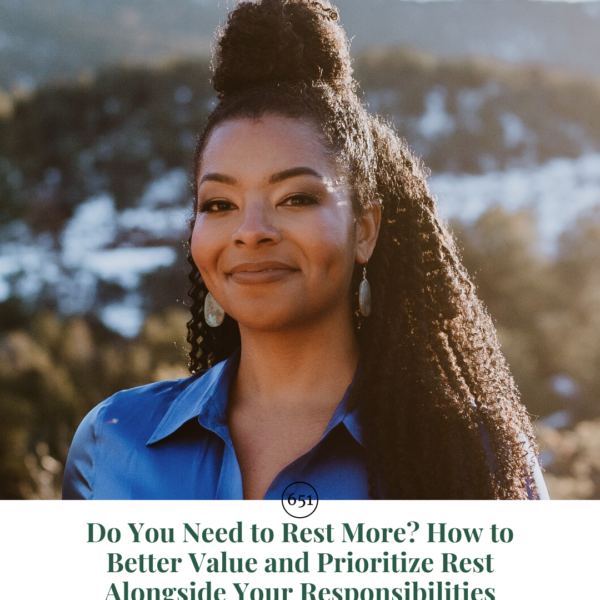“Where our body wants to be, we have to honor that. And it’s our job to do the emotional work around loving her.”
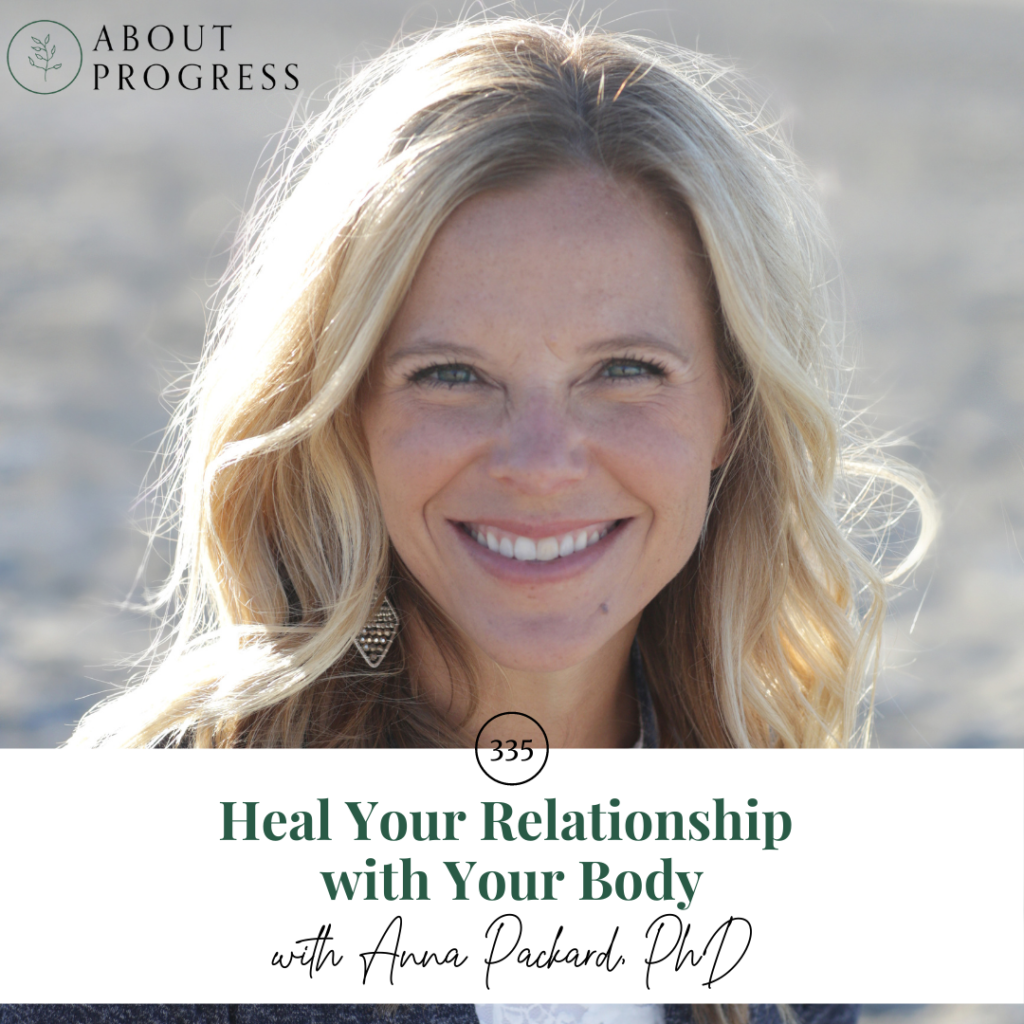
What if you could go from a place of negativity, or numbness, towards your body, to a place of neutrality? What if you could go from there to liking it, even loving it. Your body is a part of you, but it is not all of you. If this feels foreign to you, it’s time to heal your relationship with your body by stating there – with the relationship.
As we dive deeper into this month’s theme of “Honor Your Body” we are lucky to learn from Anna Packard, a clinical psychologist and Certified Eating Disorder Specialist, who shares her own story with disordered eating and how she was fueled by that into helping others. Her simple approach will resonate immediately and be something you can apply today. This is a lesson unlike what the louder voices of the world want us to hear. This is all about us changing our orientation and feeling toward our bodies. It is no longer about our bodies needing to change.

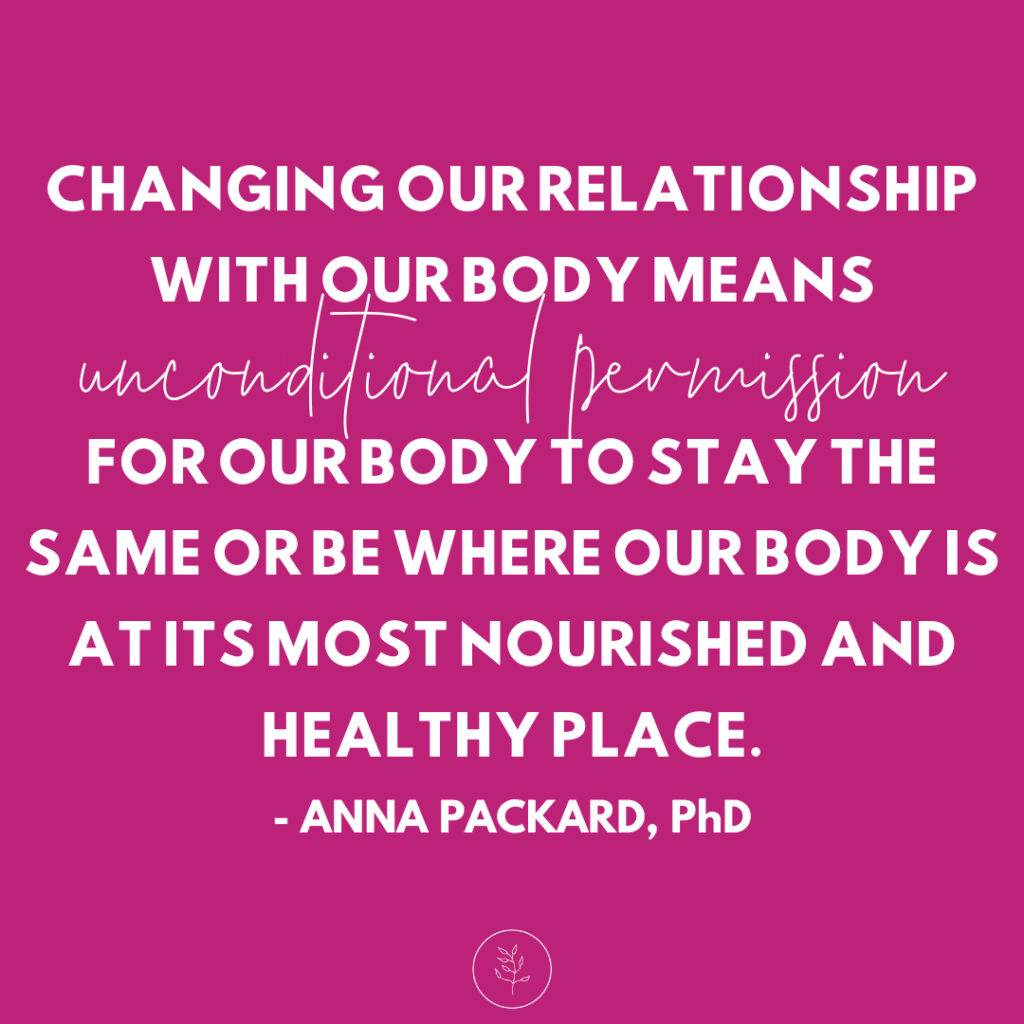
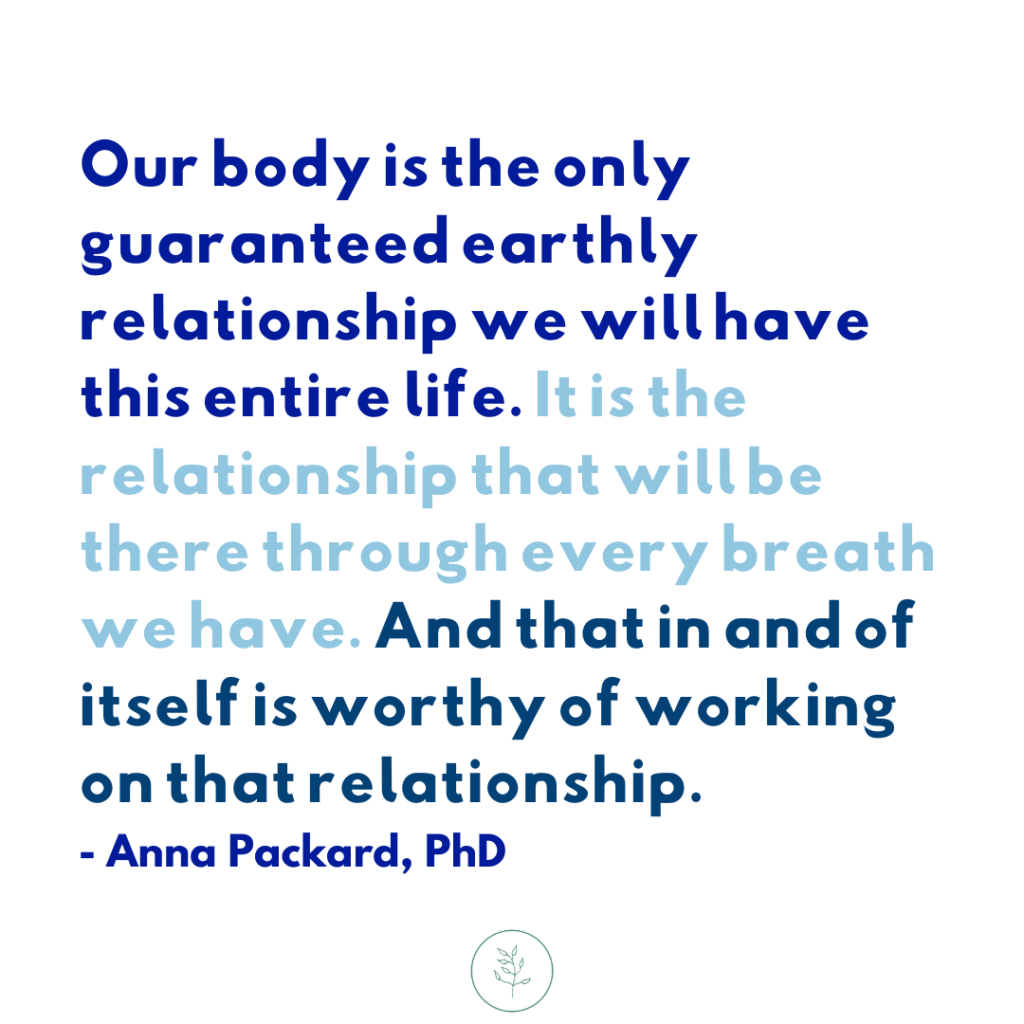
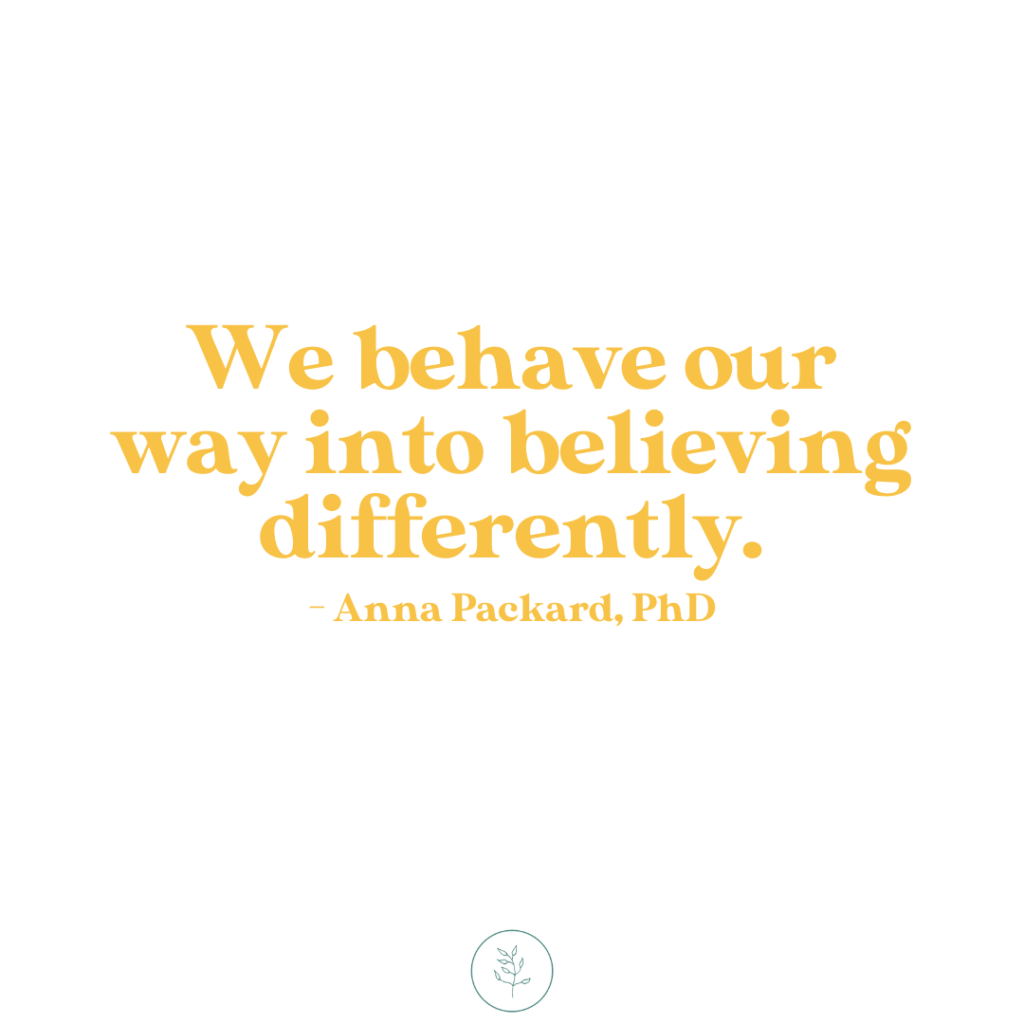
About a few other things…
Whether you’ve already jumped head first into Spring cleaning, or you’re dreading even the thought of it, the free “You Can Get Organized Challenge” is for you. Join our group challenge and hear daily live lessons from me on why you’re struggling and how to work through it. Get support + have fun + share your “Small Organization Wins!”
If you feel stuck, or lost, it’s time to uncover who you are and belong to yourself again with my newest course focused on identity. It’s never too late to find yourself! Get the 6 week audio course and workbook at Finding Me.
Sign up for the Go Getter Newsletter to get Progress Pointers in your inbox every Thursday.
You can listen the episode below, or on Apple Podcasts/iTunes, Spotify, Youtube, Overcast, Stitcher, Pocketcasts, or search for “About Progress” wherever you get your podcasts. If you like the show please share it, subscribe, and leave a review!!
SHOW NOTES
Anna’s Website
Bravery Magazine – 10% off with code ‘ABOUTPROGRESS’
Try Better Help for 10% off with code ‘ABOUTPROGRESS’
Join the free Organization Challenge
New audio course on identity – “Finding Me“
Get on the waitlist for the Strive Hive, my monthly membership group
Lend your voice and experience + be featured on the show HERE
Join Monica on Facebook and Instagram
Songs Credit: DRIVE by Dj Nicolai Heidlas @nicolai-heidlas Music provided by FREE MUSIC FOR VLOGS AND VIDEOS bit.ly/freemusicforvlogs
TRANSCRIPT
Monica: [00:00:00] Anna Packard, welcome to About Progress finally!
Anna: [00:00:03] Yes. Thank you for having me.
Monica: [00:00:06] It’s so great. I was telling Anna off the air for those who are listening, that she’s been on my list for years, for literal years to have her on the show and there’s no more “perfect,” I guess even though that’s almost like a swear word in our community, but there’s, there’s not a more perfect topic or person, I think, to discuss this topic than you, both because of how you have been through this healing that we’re going to be talking about and also how you help guide other women to do the same.
So let’s set the scene a little bit here. We’re talking about how a lot of what. Blocks our own personal development, our progress, our empowerment, our, our achievements, anything, relationships!, That you can think of is a focus on our bodies. And a few months ago we had Beauty Redefined on and they were talking about that focus and we needed to go with that.
We need to. We need to talk about how we heal it, because now that we’re learning how okay. Don’t focus on our bodies so much. Well, how do we heal this really damaged relationship with our bodies?
So would you like to just tell us a little bit of your own story about how your, your own relationship with your body got traumatized and damaged and hijacked and what that has looked like for you to heal that? And that’s a big question. I I’m well aware, so we’re kind of doing a smaller version of this, but please we’d love to hear it.
Anna: [00:01:28] Yeah, it’s, it’s a big question, but unfortunately, an all too familiar story for many of us who have grown up in this culture. Right. So I really related to, I think you interviewed Lexie, right? The Kite sisters, when they were talking about their journal entries in middle school and how they used to always talk about the diets they need to go on, and their weight loss plans.
My journals were the same. Every entry began with my weight and then the next paragraph at least was me just disparaging my body. And then as I grew further into high school in my junior year of high school, we ended up moving states and that was a really difficult and lonely period for me.
And with a variety of things going on in my life, it led to a full blown eating disorder in high school. And that continued into college. Until I remember one day calling my mom and tears and just confessing all my behaviors to her and expressing like this. I don’t think this is normal. And then my mom actually was the one who helped me get into treatment for my eating disorder.
And so throughout my undergraduate years for about a year and a half, I was in treatment pretty consistently with a therapist working through it. And at the end of that, I was pretty close to describing myself as discussed as recovered. I had worked really hard. My all my behaviors were pretty stabilized and I was going on a study abroad to Spain and my therapist.
And I, back in those days, there was no option for like doing therapy across the ocean. And so we decided like this is going to be your chance to see how recovered you are as you go on to study abroad. And I made a commitment to myself that I really wanted my study abroad to be lived fully. And I really was so excited about this.
I didn’t want my eating disorder to come with me. And so I spent that summer in Spain and I kept that commitment. So I did all the things, ate all the things. I even ironically met my future husband on that study abroad. I didn’t know that it was, it was a fun romance, sorry. And we came, I came back to Utah after that study abroad and I had gained a significant amount of weight actually in a short amount of time.
And I stepped on the scale and I got back and I was the largest I had ever been. And a very lovely and dear family member, I won’t say names said, I looked like a chipmunk. For anyone that’s had an eating disorder, you could imagine that both of those pieces would be very triggering. And for me, it was actually a really powerful pivot point where I had just come from this experience where I really learned that my happiness was absolutely unrelated to the size of my body. And in fact, how beautiful to have learned that ending up in the largest size I had ever been. And so that was one of the last times I ever weighed myself. I threw my scale away and that was really cementing myself into recovery.
And then partially, or maybe even in large part, because of my own experience in therapy, I pursued becoming a psychologist myself and I now work with eating disorders mainly, and as, as a result, always being in the trenches in this space, I think it has really amplified my continued journey with my own body to be in a really beautiful, healed, loving space that it is today.
Monica: [00:05:10] Oh, that’s amazing. I’m curious about going right back to that triggering moment. I thought you were going to lead us down another path of how that, you know, bounced you back into some of the behaviors that you were recovering from, but that was such a wonderful unexpected turn to hear that it actually highlighted for you that the size of your body.
Did not impact or correlate with your happiness. And I just wanted to like, sit with that a little bit more. Like, what was that like to process? I’m sure it wasn’t like, Oh, I’m, I’m happy. Anyway. So now it’s easy and I’m just going to go forward.
Anna: [00:05:45] Right? Right. I can just keep this and lose weight too. I just think it was such a great contrast of Spain was true freedom with food. And freedom in my body and also freedom in relationships. I think so often people who struggle with eating disorders or even disordered eating or any painful relationship with their body. May not even have awareness of how that hijacks relationships and how it hijacks intimacy. And so I had this beautiful summer where I created really deep, lifelong friends.
And as I said, I met my husband. And honestly, I think part of that was because I was in an emotional and cognitive space where I could have that relationship. Also, I had been working long enough in therapy that I think I tried to always remind myself how miserable an eating disorder actually really is even as deceptive and an alerting as it can be.
But those, those pieces I’ll serve as a really protective function to keep me in recovery. Now, what I think is really important though, too, is in that part of recovery, even though I chose to not revert back to eating disorder behaviors. It’s not necessarily that in that moment, I was in this amazing relationship with my body.
Right. It was, it was more about, wow, my body, as I said, isn’t related to my happiness, like the size of her. So that she became a non-issue and it has been years later and work later of moving in recovery from disconnecting the hatred and moving away toward my body, seeing her less as my enemy to a neutrality, to a respect, to a love, to like an actual relationship.
So that took longer.
Monica: [00:07:32] Yeah. Yes. It’s fascinating. I haven’t thought about that in that way, but your own experience mirrors my own, and I wish this was an overnight process. I wish that this could be something that, you know, we’re going to go through some of your expert advice in a moment.
I wish it could be something as we hear it and we implement it in a day better, but I think honesty is always the best policy on that’s. What we try to do in this community is, is deliver the truth and the truth is that this as a relationship like you just said, and all relationships take time and they’re going to take some give and take and some tension and some moments where they’re tested, but as you stick with it, it will become as deep and as rewarding as any, any relationship that you’ve been able to develop that depth with.
As I was sitting in listening to you thinking myself, I have bounced between my own recovery. I bounced between like this numbness. Like it just not feeling anything and total hatred. And I’ve learned the past few years that that numbness is still pretty present. The hatred has, you know, dissipated in the background a little bit more and more every year, every day, I would say that’s a very rare feeling now, but numbness is still like not being in tune, but that’s a big thing.
So wherever the women are on the spectrum, Of their struggles with their relationships, with their bodies right now, and also their behaviors. We don’t want anyone to discount themselves in this discussion because they don’t think they’re bad enough yet. Like they don’t deserve help. So I wanted to hear more about like that actual connection here.
Like let’s just talk about how can we start by healing that part of feeling connected to our bodies and then I’m sure we’ll have way more to go into after that.
Anna: [00:09:20] Yeah. Oh, I’m so glad we’re talking about this. One of my biggest passions in life is healing. Well, obviously that’s why I’m on this podcast, but it’s healing that connection with our bodies because what you described and what I described is so common that the extent of healing.
It’s making your body, just this non-entity, right. That I can ignore and I can avoid. And, and at least I’m not hurting her, right. At least I’m not hating on her. And that, that is progress. And I really want to honor that and I want to honor also what you said is. Look, our journeys with our bodies are complicated and just like anybody that’s worthwhile, it is going to take time and it is gonna take work.
One of my really good friends, who’s also a treating clinician. I love what she always says is that our relationship with our bodies can be the best love story of our lives. Wow. And what I, I like thinking about with our bodies too, is our body is the only guaranteed earthly relationship. We will have this entire life, right.
It is the relationship that will be there through every breath we have. And that in of itself is worthy of working on that relationship. And it’s complicated and we are all in a society that breeds disconnection at best and absolute hatred and loading of our bodies at worst. Right. And some people also have more complicated experience than others, like, right.
I know people in. In your community that are listening to this, I’m sure have there are people with trauma histories in their bodies or people that their bodies have featured in other painful ways in their life that complicate this. So I think about a starting point is, and healing that connection is, is absolutely what you’re describing.
It’s numbness is an absolute fine place to start, right? Is can we at least lay down the weapons of war? Can we stop actively hating on our bodies and moving toward at least neutrality and work from there. So, so I think about too, like a wish, like, do you even just want to change your relationship with your body?
Do you want to decrease the amount of time and energy, food or your body take up? And if so, then that’s a great starting point. But I want to be really clear that changing our body, our changing our relationship with our body means unconditional permission for our body to stay the same or be where our body at its most nourished and healthy place is going to be.
Even if that’s not where we think ideally our body should be. So this is all about us changing our orientation and feeling toward our bodies. It is no longer about our bodies needing to change.
So you said that’s unconditional permission to allow our bodies. How did you finish that?
I probably used. Too much psychobabble, but basically our bodies when they are fully taken care of nourished, adequately rested. They will naturally gravitate toward their set point. They will gravitate toward a size that they want to be at, where they function the best. And we don’t get to decide that. Some people like that set point.
Some people that’s not okay, but. That’s where the unconditional permission comes in. So where our body wants to be, we have to honor that. And it’s our job to do the emotional work around loving her.
Monica: [00:12:56] I love that distinction. And I also love that you started with just even a wish as a wonderful place to start, because the truth is, is I think, I mean, there’s many levels and stages to recovery, of course, but I think that wish is perhaps the hardest.
I think it’s or not the biggest hurdle, but I would say it’s the number one hurdle. It’s the one that has to come down first .
Anna: [00:13:23] It’s vulnerable, right? That wish is stepping into vulnerability. Yeah, absolutely.
Monica: [00:13:29] Yeah, because without the wish and, and I, and I bring this up just because over the years, I’ve, I’ve tried to help other people who I, and not from like, I’m taking on a therapist role.
It’s more like, let me hook you up with someone who is great, like Dr. Packard here. So, but it’s, it’s more of recognizing when others are struggling. If you’ve ever been in that position, you know, you can’t help them. Right. If they don’t have that wish. And it’s the same for us. That’s almost like your center point.
You can always come back to even when the behaviors are hard or your relationships get rocky with your bodies or whatever it is it’s coming back home to that wish. Well, what do I really want? And I want to live this way, which means I need to be willing to accept these hard parts of that. Right?
Anna: [00:14:15] Right. Cause the second part that the acceptance piece is really important because a lot of people, a lot of women do want a better relationship with their bodies, but incomes, diet culture, right? Where it’s all about changing your body is the solution. And it’s not, it is absolutely continuing to harm your relationship with your body and identify your body as a problem.
Right? So it’s both the wish to have a different relationship and that unconditional permission for your body to be who she is.
Monica: [00:14:44] Okay. I love that wish unconditional permission, acceptance as part of that. Yeah. Now let’s move into some other ways that this is so last the foundation. I really think that’s the foundation of what we’re talking about.
Let’s say women are starting to work on that. Cultivate that. What are some other practical ways that they can then move towards healing? This complicated, but necessary relationship with their bodies?
Anna: [00:15:07] Sure. So one thing I started explaining that I’ll be more overt and clear about it is one of the tools I think is one of the most powerful tools we always have at our disposal is behaviors.
So I like to talk a lot with clients about how we behave our way into believing differently. An eating disorder example would be, I could talk till I’m blue in the face to try to help a client understand that this specific feared food isn’t actually dangerous or scary, but really the way they’re going to overcome that fear of that fear food is they got to eat it and they got to eat it and eat it and eat it to learn that, Oh, I can have this scary thing that I thought was scary.
And I’m going to learn that. Allowing myself to eat it. I’m not going to overeat on it. I know my body will tell me when it’s done. Right. And they overcome that fear. And the same thing happens with healing, our relationship with our bodies. So part of that is right. We talked about. I think a behavior in two ways, right?
There’s behavior that hurts our bodies and the behavior that is loving toward our bodies. So first committing to no longer doing behaviors that hurt our bodies. And that includes language, right? The ways we’re speaking to our body even if our internal dialogue to decide to no longer internally criticize your body, also extending that no longer criticizing your body out loud or.
Commiserating with other people around body hatred. It seems to be a great way for women to bond around body hatred, but the decide to no longer do that. And then as well as like, if you are in any way, not taking care of your body, either depriving her of rest or depriving her of nourishment to commit to no longer doing things that would hurt her and moving into the space of treating her, even if you don’t believe it, but treating her like she’s worthy of respect and love.
Right? So. So honoring her needs when they show up, letting her rest moving your body. Joyfully nourishing her adequately with all variety of food from Oreos to spinach. All of its welcome. And also, I also think about moving into too, about, as you were talking about that numbness, right? And that disconnection, even just beginning to invite your body as a companion into your memories, right.
As a participant in your life and recognizing her contribution to those. One of the big things about the research on body satisfaction comes around body appreciation. So again, I think it’s really helpful to know body love doesn’t have to be the end goal here. Especially if we’re starting from a place of body hatred that can feel really overwhelming and maybe even impossible for people, but moving toward body gratitude, body respect and body appreciation are really powerful places to move toward.
So in terms of body appreciation, one way that I get here is I taught and you’ve probably heard me doing this already, I actually refer to my body as she yes. And not notice that. And I do that for two reasons. The main reason is actually that is my experience within my lift body.
I do see her as atonomous to me, she is me and she’s not me. And I have a really. I have a story I want to share about that and how profoundly I learned that. But the other part of it is practical. And just based on this idea that it is really, unfortunately, more easy for us to offer compassion to other people than it is ourselves.
And so if, if, well, first of all, I do believe again, we are in relationships with our bodies. And recognizing that she is someone deserving of respect and seeing her as someone that’s not, you, it may open up toward more compassion, opposed to when you see yourself fused with your body and the same way as you view yourself may show up like, Oh, I’m so lazy.
She’s totally like, she’s so, like she’s not measuring up to everything I want. Which what you’re meaning is I’m not. Opposed to, okay, this is what my body needs. This is how she’s showing up for me.
Monica: [00:19:25] This is so fascinating to me though, because I mean, it’s so clear now that you’ve given me the language and like this concept to it, I’m like, this is exactly what the healing looks like, but I didn’t realize that that’s what I was doing or other people were doing, it’s looking at, you know, it’s a partnership, but it’s not the same. Like I am not my body, but my body is important. It’s important to me. And I’m a partner with it, but it’s not who I am. It’s not an in place of who I am. It’s not my identity.
Anna: [00:19:55] Right. So can I share that?
Monica: [00:19:58] I would love that story. Yes, please.
Anna: [00:20:00] So I think this is the experience that actually shuttled me in toward body love. And again, I want to normalize, like I have been in this field, I’ve been treating eating disorders for over a decade now, and I’ve had a good relationship with my body for a long, long time.
And it was only three years ago that it shuttled into a space of love. And it was because of this experience that happened. So I experienced about four years ago, I experienced secondary infertility. We had had three kids and we wanted one more and I was having recurrent miscarriages. And so we ultimately, after my fourth miscarriage, we went and sought fertility testing and treatment, and they put me on a fertility drug and.
We were lucky enough that the first round I was able to get pregnant. But what they didn’t know is that I was pregnant in what’s called a heterotopic pregnancy. And so I was pregnant with twins, but one was in my uterus and one was in my fallopian tube. And they didn’t see the one in the fallopian tube that went on discovered.
And then when I was seven weeks pregnant, I was in the ER in intense, intense pain. And it was actually there that my fallopian tube burst. And I went into emergency surgery. No one knew what was happening. I didn’t even know what was happening. They thought that the fertility drugs had like enlarged my ovaries and that they were twisting and there was just decreased blood flow.
But no, it was actually a baby in my fallopian tube. And anyway, so I went into emergency surgery and when I woke up hours later, And they told me what had happened. I had lost almost half of my blood in the process. I ended up getting four blood transfusions. But what was really profound for me was this awareness that my body kept me alive.
There was absolutely nothing that Anna, the Anna the identify as I was not conscious in that place. She stayed alive. She was the one that preserved me and she miraculously also preserved the life of the baby and my uterus. And so this, that just really changed everything for me, developing this awareness that she functions completely outside of my awareness.
And she is chronically taking care of me in little ways every moment, she literally saved my life. She saved my existence. She hung in there through a very traumatic experience.
Monica: [00:22:51] Oh, that’s everything. And this did come from Beauty Redefined. They said I think this was years ago.
They said that in a post and I’m one of those people, I forget thing as soon as I forget something, as soon as I read it, but the stuck out to me, they said the same body you have now is a body that you had as a three-year-old like it’s carried with you forever. And I’ve thought about that with You know, Prince Phillips just died, I know this seems like where’s she going with this?
But they had like this whole video montage of him growing from like a baby and his face changing to like a toddler and then a teenager, and then the young adult and then older man, and then a very old man. And I was just like, incredible, incredible bodies can do that it carries us through this entire life.
And yet we’re criticizing it for like two thirds of that time, you know, enough.
Anna: [00:23:37] Right. That reminds me of something really simple. I like to do that. I like to draw awareness too with clients is I’ll ask them to just notice that they’re breathing and then know this, that they’ve been breathing this entire time, but haven’t been noticing that they’re breathing right.
That, that our bodies are chronically there for us. Through the good and bad and have taken us on every adventure we’ve ever gone on. Any worthwhile memory we’ve ever had in our life has most likely, fundamentally involved our bodies.
Monica: [00:24:16] Hmm. And it’s so easy to forget it. It’s so easy. I think a lot of the women in this community, I’ve, I’ve learned over the past few years, many of the women in my community might not struggle with eating disorders or even disordered eating, but they struggle with massive health problems where their bodies are getting in the way of them living their lives.
And that’s really complicated. And I, and I was just hoping you could touch on that just a little bit for those people who are within that specific need, how can they still. Work on seeing their body as a partner rather than the thing that’s getting in the way.
Anna: [00:24:51] Absolutely. So I have another story to go with that too. So in the last five years or so have developed an autoimmune disease that causes a lot of disruption in my life too. And I certainly don’t want, I, I want to be careful to say that I still largely retain my health and all my capacities. And I know that’s not the case for a lot of people out there that they struggle in their bodies and very profound ways.
And this has been a learning curve for a new learning curve for me, with my body where I can’t move the way I have always been able to, I have to change it. I have to alter it. I have to respect her a lot more. I have to sleep a lot more. But when this was starting, before we really knew what was going on, I was just having this painful experience in my body.
And I remember it was winter time. And I was driving and reflexively again, it’s really common and honestly, reflexive for us to be frustrated, critical when things aren’t going right. And I honestly don’t know. How I wasn’t in that space, but I was driving and I was holding my, the steering wheel and my fingers were just hurting.
And I remember lifting my hands off the steering wheel. I was at a stoplight, it was safe. And I just looked at my swollen knuckles and I just had this thought they are doing the best they can. And I really believe that about all our bodies. And I think about how if we can be compassionate and that’s also, there’s nothing about that statement that’s also untrue. Our buddies are always doing the best they can with what they have. And if we can have that compassion for our bodies, how powerful can that be to translate to ourselves too, right? That we are also doing the best we can with what we have. And that doesn’t mean we have to like it.
I actually think about if we can lean into what is our body, both asking of us both physically, but what is it asking for us in terms of growth? What is it asking for us to learn about ourselves, but also in relationship to her?
Monica: [00:27:16] Right. Yeah, again, it goes back to what you talked about. It’s a partnership, but it’s also a separate entity in developing that compassion.
Like you can let someone else that you love, that changes so much. I thank you for letting us go off the rails a little bit to speak on that, because I know this is a big need that women are facing, who are listening here. What, what other things could you say for people who are, you know, going down this path of healing your body, is there anything else that you would advise them to do?
I’m sure. A lot, like month’s worth of therapy
Anna: [00:27:48] so much. I could talk about this forever.
Monica: [00:27:51] We’ll just have to have you come back for a part two. Okay.
Anna: [00:27:53] Absolutely. But one thing I think about in terms of body appreciation, I know this sounds simple, but it doesn’t mean it’s easy, but I talk about body gratitude.
And sometimes people go the route of, you know, think about, think about your senses and what you’re grateful for that they allow you to do or experience in the world. But I like to take that further, because I think in terms of healing, our relationship with our bodies, we have to include her in our stories and in our life.
So I think about, okay, I love for people to take 15 to 20 minutes and think about the important moments of your life or think of it one. And then I want you to really relive that memory in your mind. And then I want you to think about what part your body played in that memory, right? You saw this amazing view when you got to the top of this mountain on this hike and it was sunset and you were with your good friend and you’re having this amazing conversation.
In what ways would you not have been able to do that? Had your body not taken you there? Right. And then I can also be like, you know, when you hold your own children or your pets or your nieces and nephews, and you can smell them, like what ways is your body allowing you to live fully? And can we be grateful for her, for those moments that make our life worthwhile?
Monica: [00:29:25] A lot of this comes back to another thread that I had been experiencing my own life as the, the need to slow down, to be present, to prioritize connection over productivity and presence over rushing around and doing, doing, doing so much of what I think our numbness towards our bodies is, is just our numbness towards life.
And that’s hard, right? Because if. It feels easier to protect ourselves from feeling too much. Just like it’s easier to protect ourselves from feeling too much towards our bodies, but that’s not being a fully developed, mature person. And I don’t want to be an 80 year old. Who’s still rushing and not feeling and taking life in, you know,
Anna: [00:30:13] I related a lot to you. And you described another podcast where I think you like out hustle out, produce your emotions. I am definitely vulnerable to that as well. And I think I really liked the intention, right? The setting of our intention, I need to slow down and also normalizing this. It doesn’t have to be perfect to be intentional, right.
Like I don’t have to be present every second of the day, but I need to move toward slowing down and spending more time being embodied, more time being present with this moment, with these people, with this sunset, all those things.
Monica: [00:30:51] 100%. And the thing that helps me with that, just like you said, it’s not all or nothing. It’s looking for moments. So it’s just like, I do that with my kids. I, I might not have. You know, two hours or even sometimes 10 minutes, but I have a sprinkling of moments to connect with them. And I have that with my spouse and myself and my body. And that’s what I’m trying to work on a little bit better is creating those little, just sprinklings of moments of connecting to myself, my emotions, my body, which is hard. It’s a new, it’s a new way. The new way of living for me.
Anna: [00:31:28] Well, it’s like, and not to be cliche, but. Moments are our lives, right? Like the moments we attend to are the moments that make up our lives.
Monica: [00:31:38] There’s some quote, somewhere I’m going to have to find out who said it, but a good life is just as how they word it. You string along many good days. That’s what creates a good life. And I’m sorry for whoever said that and I just butchered it, but you can take the heart of that message.
Anna: [00:31:55] Well, in my mind, I’m like I ended up, I can’t remember, but it was something about like at the end of life, you’re going to realize it wasn’t the big things. It was all the little things. Yeah, this place or something like that.
Monica: [00:32:06] And we’ll have to have anyone who’s listening, who knows bowling, the word for word quotes. We were both trying to say. And who said them feel free to chime in.
This is a self-development show. So I always love to ask a final question. And of course, we’re going to have to find out where people can go to find more of you and to work with you and all of that. So we’ll do that as well for people who are waiting for that. But I like to know what, what are you working on?
What’s a habit, a way of being, or doing or not, stillness, which you talked about that you are working on right now.
Anna: [00:32:36] Yeah. So I got this idea from you actually. And yeah, so I have always liked writing and I’ve always harbored this fantasy that I could write someday. And I found it always safer just to stay in this like fantasy place of, I could have been a writer.
But I finally this year decided to take a writing class. And it was one that you suggested. So I am taking a writing class and it’s vulnerable and I’m allowing myself to do it imperfectly. And another thing you inspired me around that was I don’t, and again, I’m going to butcher what you said, but the message, the message I got from you was I don’t have to produce something large.
Life-changing is super important. It is important because I’m important. Okay. And that like, felt really like permissive, like, okay. Yeah. I’m just, I’m going to do this. So that’s what I’m doing right now this year too.
Monica: [00:33:41] And are you doing that? Writing class through Ashmae Hoiland, who was on the show? Awesome. Yeah, I took that too. I think you, yeah, yeah. Yeah. Awesome. I wasn’t sure if I had told you I took the class or if I just shared about her, but awesome. That is so great. It’s such a good course for whoever’s listening, Anna, that really made me smile. So much like, Oh, that’s just what I want for all of the women who are here.
Just take that courage, take that leap. And we all need it. Like I said, I am learning, I need to slow down in some ways and make more room for life and creativity. So. All right. So for those who are wanting to find more, where should they go?
Anna: [00:34:18] Well, I. If you want to learn more about me, you can go to my professional website.
It’s w w that’s probably redundant. You don’t need to say that.
Monica: [00:34:29] I don’t know why that www is so hard to say, but yeah,
Anna: [00:34:32] I know. Right. But balancehealthandhealing.com. It’s balance, not balanced, it’s balancehealthandhealing.com. And that’s just a link to the private work at, and I share with amazing Fellow women therapists who share this passion and this expertise and are all about healing the world.
And we also have like a blog that we do. Some of my new writing I’ve been sending it into that space has been showing up on our professional blog. But we have that if people are just looking for information, but that also linked to our services and what we offer.
Monica: [00:35:11] That’s so fantastic. And it’s so clear that you are so good at what you do. And I don’t know, I just, the woman in this community, that’s how we’ve met through just this, this amazing community. Right. They just blow me away and you absolutely are one of them. I’ve looked up to you for years, admire the writing, the courage. I have read many of your, your blogs, they wrote in the past.
So You’re just one in a million or a billion or however many billion people are on the story. So thank you very much, Anna. I appreciate, well,
Anna: [00:35:39] I feel, I feel the same about you. Yeah. Thanks for having me.
